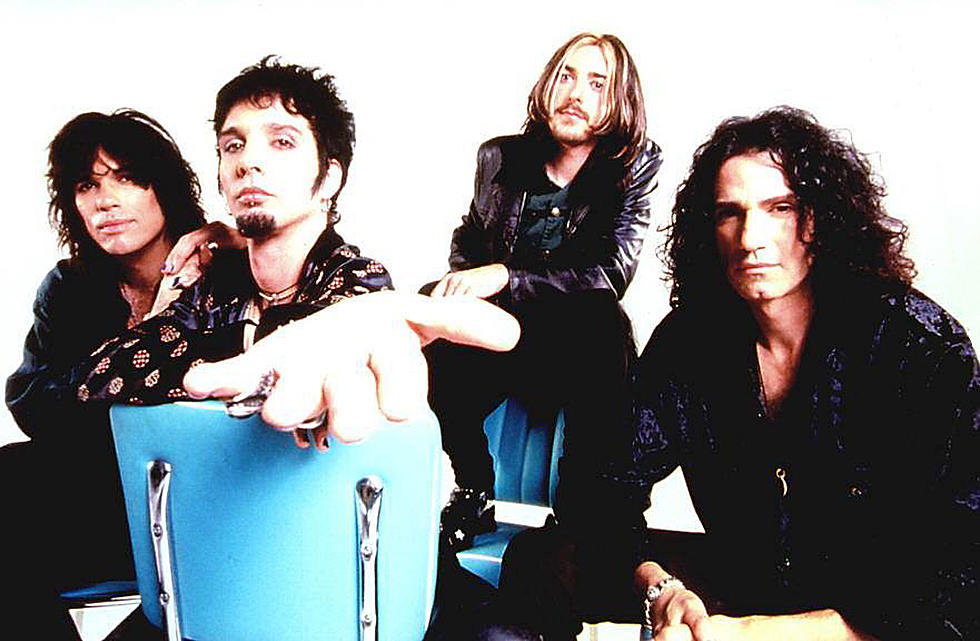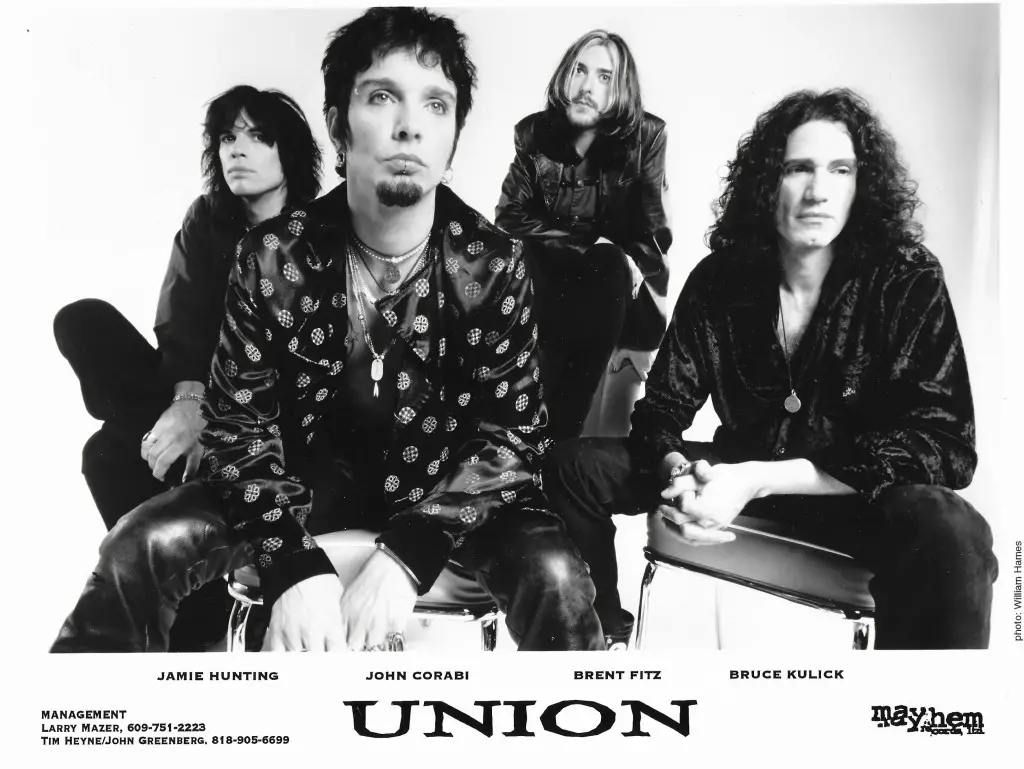All images courtesy of Bruce Kulick Twitter (official)

By Andrew Daly
andrew@vinylwriter.com

When I think back on the most underexposed bands of the 90s, for me, it’s hard not to lock in on Union. For those that haven’t heard of Union, which is sadly for too many, Union was a supergroup of sorts, and for me, it was a band that moved the proverbial needle during a time when heavy rock music was getting a bit weird in some ways.
At its crux, Union was composed of Bruce Kulick on guitar, and John Corabi on vocals, and that dynamic duo was ably flanked by Jamie Hunting on bass and Brent Fitz on drums. If that’s not an impressive lineup, I don’t know what is.
As we know, talent is not always what makes a band successful. You can have all the talent in the world, but if you don’t have chemistry – you’ve got nothing. Thankfully, Union was a band with nothing short of innate musical cohesion. A magical blend of talent, songsmith and that ever-so-special fairy dust seemed to be gingerly sprinkled across this band. It was with all of that in hand, that the foursome journeyed into the studio in 1997 to record what would become its self-titled debut record, Union.
Now, in short, if you’ve not heard this record yet, and you’re a fan of heavy rock – you’ve truly been missing out. To say it’s special would be an understatement. For fans of KISS, Bruce Kulick, John Corabi, and good music in general, the album is a must-listen.
I first heard the album some years back, and over the years, I’ve grown close to the music. In doing so, of course, I’ve tried to dissect what it is that makes the album so special. For Kulick, and Corabi, one might surmise that they both had something of a chip on their shoulders, as Kulick had just left KISS in the wake of the 1996 Reunion Tour and Corabi had just left Mötley Crüe under a similar circumstance also in 1996.
Drilling down further, one might want to endeavor to deeply understand the songwriting from both a lyrical and musical standpoint. From my vantage point, one obvious observation is that the music of Union is innately heavy, perhaps some of the heaviest music that any of its four members had ever recorded to date.
As a KISS fan, I took notice of the fact that Kulick in particular had a rather large role in the writing and recording of his final album with the band, Carnival of Souls (1997), which was quite literally the heaviest and grungiest album KISS had ever recorded. I couldn’t help but wonder the Kulick’s direction with Union was inadvertently happened upon during his waning days in KISS.
In a 2021 interview with Kulick, I asked him just that, to which he responded, “That’s a great question, and I see how you would connect the dots that way. I feel that music was really changing at the time, and it was getting darker and grungier. We know this, and I think that Gene [Simmons] was really embracing that stuff quite a bit. He liked some of that darkness that some of those bands had. He was attracted to the drop-d tuning and all those things, but Paul was not so sure. He was not a big fan of flannel shirts and all that. [Laughs]. So when we started to work on songs and this had nothing to do with the Reunion Tour, Gene was the one that was really writing, being creative, and working on stuff, and I worked a lot with Gene. Eric [Singer] would be involved, and we would jam in these kinds of funky studios and come out of there with ideas. Some actually did make it to Carnival of Souls, and some wound up on Psycho Circus like ‘Within.’”
So, ultimately, my theory was out the window. Regardless, whatever forces were at play during the recording of Union, they allowed these four musicians with storied backgrounds to come together, and create what I estimate to be not only the album of the year (1998) but one of the albums of the decade. There will be many who clench their firsts in rage over this, but I feel that Union stands tall and proud up against any of the 90s best. Be it Nevermind, The Colour and the Shape, Ten, you name it, Union is right there in that conversation.

As far as the record goes, the album kicks off with “Old Man Wise,” and it’s a literal gut-punch of a song. Churning riffs, deep bass grooves, and heavy drums kick in before Corabi lays into it. As far as openers go, it’s a killer. From there, things careen into another heavy hitter in “Around Again,” which is deeply heavy. Kulick’s guitar and Hunting’s bass are in lockstep with one another, Fitz ably hammers away, allowing Corabi once again to send it home.
Taking it down a notch, “Pain Behind Your Eyes” washes over the listener, allowing us to see the subtle nuances of the band’s varied musical approach. Next up is what I feel is the showpiece of the album, “Love (I Don’t Need It Anymore),” which features some fantastic lyrical imagery, and perhaps one of the finest vocal performances of John Corabi’s career, which is really saying something. The track is a stunner, and its chiming guitar work alludes to a different side of Kulick’s playing. In short, those who thought any of these musicians were one-trick ponies are to be proven wrong here and now with this track. How it wasn’t a hit is still unbelievable to me. If you’ve not heard it, spend some time with the track, and bask in its glory.
Rolling on, “Heavy D,” Let It Flow,” and” Empty Soul,” provide deep texture to the album, eliciting emotive bliss, and taking the listener on a journey through all of the band’s influences. Another favorite of mine is “October Morning Wind,” but for different reasons than “Love (I Don’t Need It Anymore).” “October Morning Wind” is far from a rocker, but it is upbeat. I find it akin to early 70s Zeppelin, where they might rock out but in an acoustic sense. What I also love about this track is it allows listeners to see the softer side of Kulick, who is one of the genre’s premier acoustic players. Many readers and/or listeners will know Kulick for his sensational work on the electric guitar, but it’s the subtle beauty of his acoustic side that impresses me most. His harmonics, picking, and phrasing are monstrous on an ESP electric but were made for a Gibson acoustic, but that’s just this writer’s opinion.
Winding down into the last quarter of the record, we have a very solid mid-tempo rocker in “Get Off My Cloud,” and one of the album’s fiercest tracks, “Tangerine.” I personally love “Tangerine,” and I slot it in just behind “Love (I Don’t Need It Anymore)” in terms of placement. The track serves to showcase the other side of Kulick’s ability as a six-stringer, amplifying the duality of his playing to perfection. His soloing is nothing short of divine here. If you’re looking for another 90s deep cut – look no further.
As the album comes to a close, we’ve got another track that shines the spotlight on the band’s gentle side in “Robin’s Song.” I can’t put my finger on why, but this track always gave me Black Crowes vibes. In any event, John Corabi is in truly fine form here, and if anything, the track puts the world on notice that he is handily one of rock music’s more dynamic vocalists.
Finally, the album wraps with an outstanding cover of my personal favorite Beatles song, “Oh Darling.” Soaring vocals, thunderous drums, silky smooth baselines, and spot-on guitarwork define the track, and while it’s probably something of rock ‘n’ roll sacrilege to say so, I do in fact prefer this version to the original.
All in all, I’ve always felt Union to be an outstanding debut effort, and retrospectively, the passing of time has done nothing to dispel that notion. Twenty-four years on, the album is aging like a fine wine, and it does my heart good to see that Union’s two studio albums have garnered an upcoming reissue, and I was even happier to see that copies of the physical release sold out during the preorder phase. I can only hope that the four members of Union come together once again for some shows in celebration of the wonderful music the band made.
Union was a great band, and they made some outstanding music. There isn’t much more I can say, and so, I leave you with a quote from Bruce Kulick regarding his feelings about the band, “I want to mention one thing about Union. It’s kind of funny. I hope people out there will understand. I was always really proud of that group, but I was always very sad in some ways. I wouldn’t say I was hurt, but I was extremely frustrated with it. Every time we tried to take a step forward, we wound up going back two steps. Every triumph would turn into something weird. And I’m hoping that in retrospect, now people can give it a fresh listen and really enjoy it and embrace it because I loved all the guys in the band, and I love the music we made.”

– Andrew Daly (@vwmusicrocks) is the Editor-in-Chief for www.vwmusicrocks.com and may be reached at andrew@vinylwriter.com





Leave a Reply